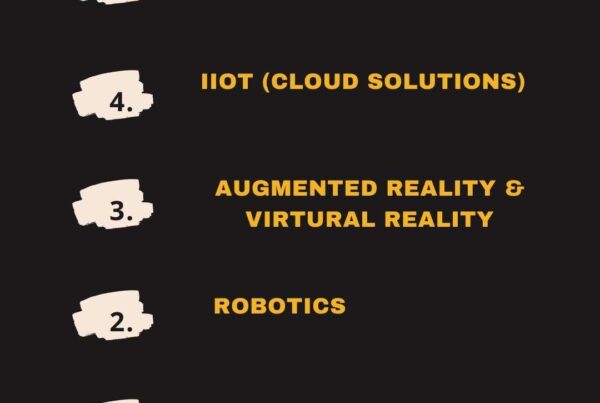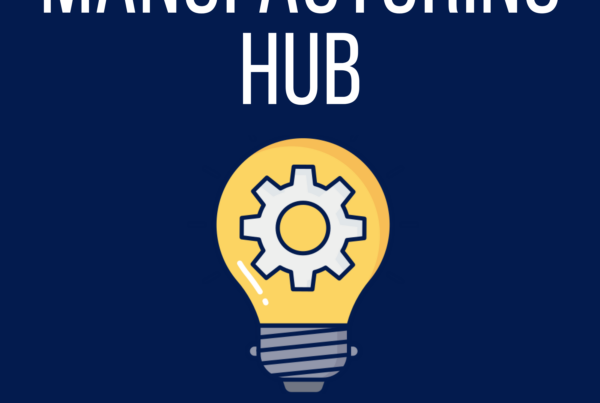The Future of Industry 4.0 (feat. Justin Dean)
Justin Dean tells us what he thinks the future of Industry 4.0 is going to look like for automation and Manufacturing.
This is part of a great longer podcast that will be dropping soon. Stay tuned for the full release.
What do you think Industry 4.0 and Digital Transformation will look like in the future? Drop your thoughts in the comments below!
Transcript
Justin: So, yeah, my wife had to set up my first email account,
Dave: This is the beginning of April, 2020. we’ve got COVID-19 and Coronavirus going on. We had talked before and a lot of the companies that we work with because they’re manufacturers are considered essential services and they’re, they’re up and running. Oil and gas isn’t doing all that great at the moment. And, we should take a moment just to say, you know, our thoughts and prayers as Justin and I have talked about, go out for everyone who is, you know, adversely affected by it, more than us. And, that kind of brings me to the question of what do you think is the future of industry 4.0 ? Coming from the guy who wanted to be an electrical engineer, didn’t think that he was going to need a computer in college, is currently sitting in front of at least one computer, could be up to like five computers with the most professional podcasting setup of, of the two of us. Like, what are your predictions for industry 4.0 in the future?
Justin: I mean, I, I they, I think really in a nutshell, I think the industry for the future of industry 4.0 is going to be when you have situations like you’re in right now when things are like shutting down, you know, like you’re talking about like shutting down the whole whole countries wherever as companies are going to be looking at, are we looking at, well I can’t afford to be like, just shut down. So even if I can’t have people doing these things, I need to still be moving along. Right. And so I think that you’re going to see more and more opportunities for, all the different things that involve industry 4.0. So if you look at like automation and ticker is, you’re going to be looking at, you’re going to see more and more of those things. Maybe like computer vision or you know, stuff like that going into, assisting these situations in terms of like keeping things moving along because you’re gonna be, cause you do have the situation right now where people can’t work right in there.
Justin: like they normally were so like say manufacturing environments or whatever where they might have people now stay at home because those situations may have not, you know, like right now may not be very automated or wherever. But because of this situation I think you’re gonna find there’s going to be more of that is going to start to happen. People are going to invest in automation because they know like, okay, if this happens again or if you go into phase two or three of this where you have a bigger situation, which I believe this is really only phase one, even though I’ve heard people say this is like maybe phase four or whatever, but I think you’re going to see it from that perspective is how I see sort of like the future of like industry 4.0 considering like whatever, what is going through Like right now today, you know, so
Dave: No, completely. I, I agree with you. I know that you talk about industry 4.0 a lot and I talk about industry 4.0 and digital transformation and I’ve been telling everyone that I talked to, you know this right here, right now as an inflection point, all of the Deloitte and McKinseys of the world who have been saying that there’s going to be, you know, a a hundred billion, gazillion dollars invested in manufacturing in these initiatives over the next few years. And most of us have been wondering where they think all this money is going to come from and like what’s going to be the thing that pushes people into it. I feel like unfortunately this is going to be the thing that pushes people into looking at industry for looking at digital transformation, looking at automation and overall technology solutions. Because the old adage of we’re going to continue to do what we’ve been doing because it works is literally no longer true that that is no longer an answer because things that we’ve done in the past are no longer going to work into the future and we’re going to have to find new innovative ways to do that.
Justin: Yeah. Yeah. No I think, well even like, like as we have a customer that is in a, is in an industry like I think the water industry or something and like they have all these projects and we have, you know, some projects we need to get done well you have to travel well. We have to travel to a certain part of the country or much. There is no travel going there cause pretty much the whole state’s like shutdown and so it’s like well so now it’s okay well now okay well it’s time to set up remote access and things like that to do even like simple things like studies, right Like assessments and stuff like that. You’re going to see like people now are going to have started looking at like the whole working from home or working remote, all that whole idea, people been against it for a number of years to a certain extent.
Justin: Like you always had certain certain companies that sort of thought forward saying, okay, I can have all these resources, right. All these employees who work from wherever, you know, like live cause they don’t need to be at the office or whatever situation is there, but now you’re seeing it more B, it’s more amplified now. So that’s probably why, you know. Well, so now you see more people own zoom and stuff like that. I’m sure now for sure. and so I think that that’s sort of like, kinda just going to be the normal moving forward. I mean, you’ve proved out that you, everyone can work from home or work remote when they have to. Yup. And so, and so that’s where I think a lot of the people right now, at least in my, in, in some of the industries I’ve help I guess is that, is that, is that, that’s been proven.
Justin: So now they’re like, okay, well I’m accessible now for someone working remote even after this thing’s gone because it makes sense or whatever. You know, if things do continue to get done on the flip side, you got people that were used to going into an office or into, into their work or whatever and now they’re been asked to work from home and it’s like culture shock. Like you basically, I mean it’s like, okay well how do I, how do I work from home Like, you know, like I mean it is a challenge for some people. Like I am seeing that, like some of the folks that I work with for my customer and stuff that I see were how they struggle because they’re used to going to work every day. And I, I don’t have an issue with it cause I work remote and I’ve done all of the above I guess. So it’s really not that big a deal, especially if you work for integrator. It’s sort of like, I guess a mixture of all of it anyways. So, but yeah, I mean I see where there is that is sort of word’s been proven that it can be done, but also it is a struggle for people to sort of just change the whole, their whole mindset to like, well this might be how it is for a while. Anyway, you know
Dave: No, I, I completely agree with it. Justin and I think that that is a good stopping point with the promise to everyone listening to this that we are going to have to get Justin back on in the future to continue talking, to continue talking about this, to continue to see how as the world changes what Justin is seeing, what I’m seeing, what everyone else is seeing, happening in manufacturing, in technology in industry 4.0 and digital transformation, all of the above. Definitely perfect. So I’m a wave goodbye to, well, if you can see me from my Newfoundland picture, wave goodbye to everyone. We’ll see you guys soon. Bye, bye.



